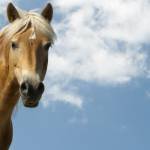How Horses Pay Attention

When trying to teach your horse a new trick or task or even just review basic skills, do you ever feel like shouting out in frustration, “Why won’t you pay attention?” According to a recent study*, “paying attention” turns out to be a complex process.
“Attention is described as the ability to process selectively one aspect of the environment over others,” wrote a group of French behaviorists in their recent publication.
They went on to explain that being able to pay attention involves multiple processes. First, the nervous system must receive information from the environment (e.g., visual and auditory cues) and then organize that information to ultimately generate specific behaviors in response (e.g., run away from predators).
In fact, the researchers emphasized, “Attention is considered to be an underlying factor in a variety of cognitive processes, such as learning, memory and categorization.” Ultimately, the researchers suggest that these so-called attentional processes may lead to better decision making in terms of:
- Predator detection;
- Social cooperation;
- Competition;
- Communication; or
- Social learning.
In the study, four types of attention were described:
1. Selective attention, defined as the ability to maintain the same behavior in the presence of distracting or competing stimuli;
2. Divided attention, which is the ability to respond simultaneously to multiple tasks;
3. Sustained attention, the ability to maintain a consistent behavioral response during continuous activity; and
4. Alternating attention, defined as the ability to shift the focus of attention and move between tasks that have different cognitive requirements, therefore controlling what information will be selectively processed.
Based on a novel “visual attention test” designed by the research team, attentional skills appear individual, and those skills remain constant across time. Most importantly, the attentional skills a horse possesses can actually help predict learning ability.
“Studies also show that supplementation with omega-3 fatty acids, especially DHA, can help support cognitive function and enhance trainability,” adds Kathleen Crandell, Ph.D., an equine nutritionist with Kentucky Equine Research (KER).
KER offers EO•3, is a potent marine-derived oil rich in omega-3 fatty acids that is easily top-dressed onto a horse’s feed. Not only does EO•3 help adult horses, but supplementing pregnant mares also supports trainability and retinal (eye) development in their foals.
*Rochais, C., M. Sébilleau, M. Houdebine, et al. 2017. A novel test for evaluating horses’ spontaneous visual attention is predictive of attention in operant learning tasks. Naturwissenschaften. 104(7-8):61








